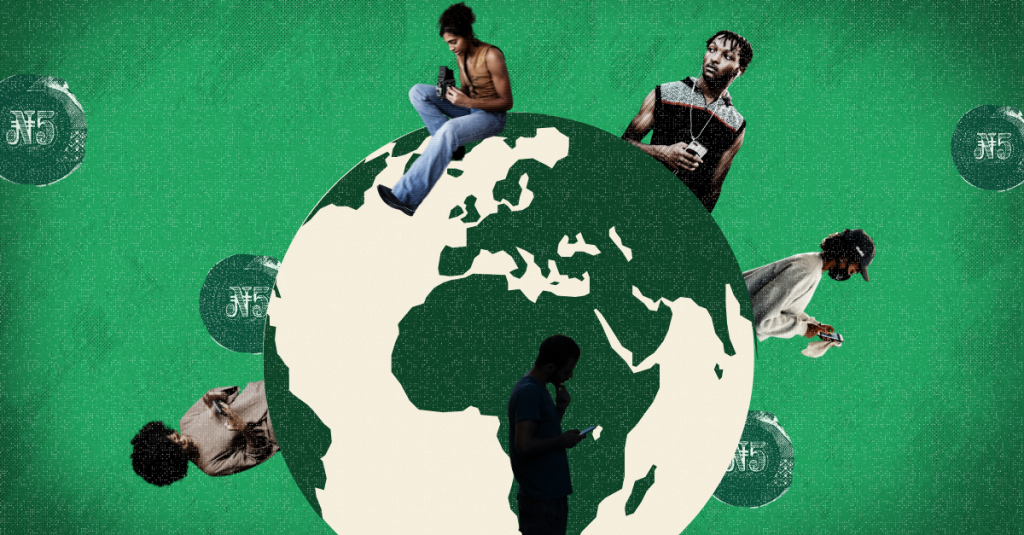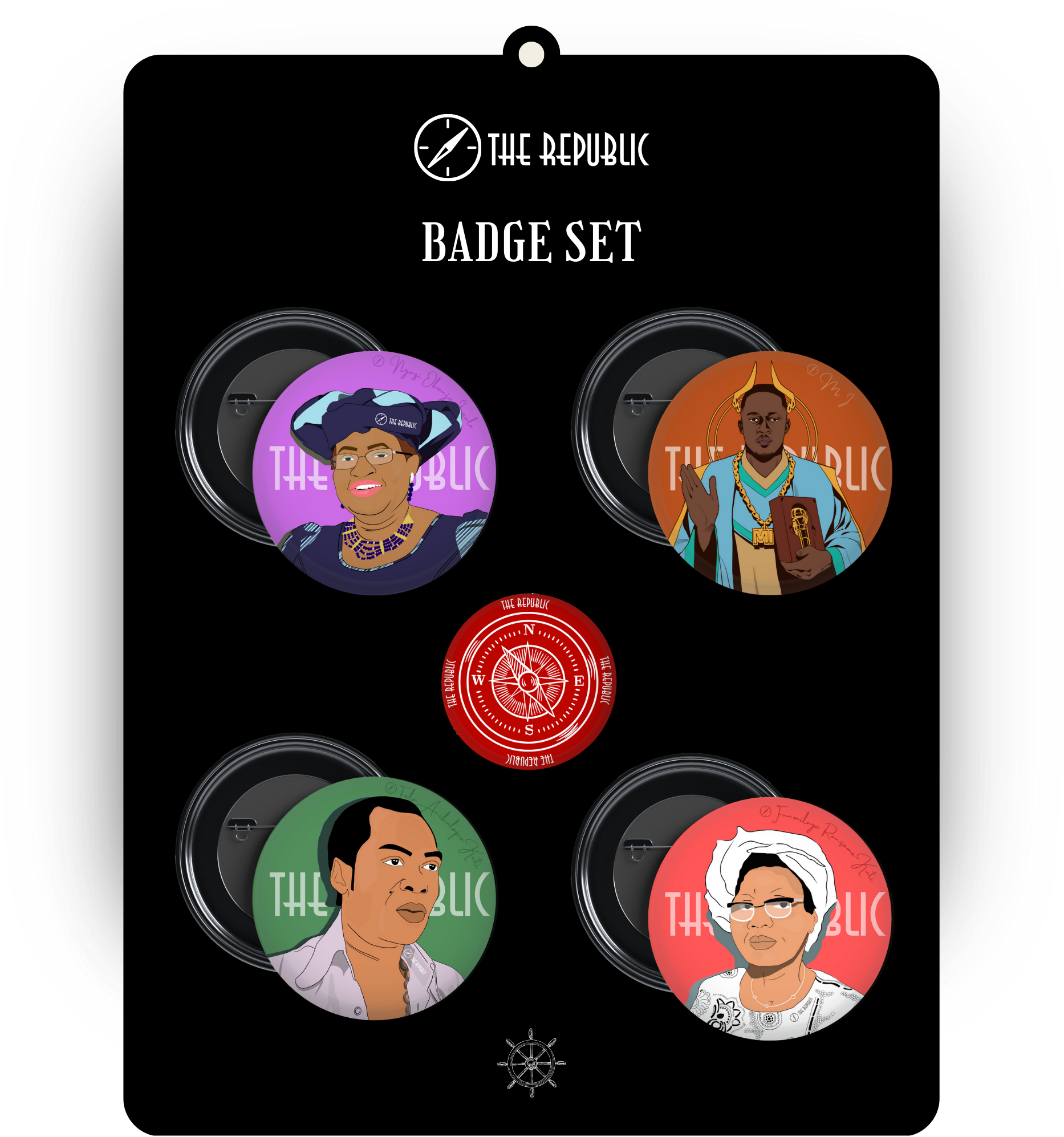
Photo Illustration by Ezinne Osueke / THE REPUBLIC. Source Ref: UNSPLASH.
THE MINISTRY OF BUSINESS X THE ECONOMY
The Financial Chains on Nigeria’s Digital Workforce

Photo Illustration by Ezinne Osueke / THE REPUBLIC. Source Ref: UNSPLASH.
THE MINISTRY OF BUSINESS X THE ECONOMY
The Financial Chains on Nigeria’s Digital Workforce
Nigeria’s digitally skilled youth serve global clients, yet payment restrictions block them from reaping the rewards of their labour. Despite the country’s digitally savvy and entrepreneurially driven youth population, many young Nigerians remain locked out of global financial systems thanks to systemic exclusion. This exclusion is a serious policy oversight and a structural threat to national and international development, which has turned Nigeria into a modern economy struggling under an outdated monetary policy.
Nigeria’s financial system was built for a time when trade was mostly local and global transactions were rare and slow. Today, it struggles to meet the demands of a digital, borderless economy. In 2023, the Central Bank of Nigeria (CBN) took steps to modernize its monetary and foreign exchange (forex) policies, most notably by unifying exchange rates and pledging greater transparency. While this reform marked major progress in liberalizing Nigeria’s forex system, it has not translated into meaningful access to foreign exchange for individuals or small businesses. In theory, exchange rate unification should reduce the need for capital controls (government restrictions that aim to limit exchange rate fluctuations caused by volatile flows) by allowing foreign exchange to flow more freely through market mechanisms. However, capital controls remain in place for the Nigerian market due to a deep-rooted culture of regulatory gatekeeping, a lack of political will to fully liberalize access, and an outdated institutional mindset that treats individuals and small businesses as forex risks rather than economic opportunity drivers.
When Nigeria unified exchange rates in June 2023, allowing the naira to devalue by over 36 per cent, it marked a dramatic pivot from the previous multi-rate regime. As Reuters noted, despite this high-profile reform, foreign currency shortages and distortions remained. Proving that rate unification alone does not automatically dismantle capital controls.
Most international transactions in Nigeria still route through traditional banks or CBN-approved operators. These channels impose practical access restrictions such as blocking platform payouts, enforcing strict capital flow rules, applying poor forex conversion rates, and delaying fund transfers into domiciliary accounts. Many of the restrictions Nigerians encounter when trying to access forex arise directly from the formal regulatory measures implemented by the CBN. The CBN caps individual transactions at $5,000 quarterly, mainly restricted to travel, tuition and medical payments and limits Bureau de Change (BDC) operators to $25,000 in weekly foreign currency sales. While these rules apply formally to BDCs and certain types of forex usage, individuals with domiciliary accounts can withdraw their foreign currency inflows in full, subject to bank liquidity and verification. Cumulatively, these restrictions contribute to a broader risk-averse environment, where banks, facing compliance uncertainty, often delay or reject inflows to individuals whose earnings are not clearly defined under approved categories.
The overall policy environment and these layered restrictions signal a reluctance to fully liberalize forex access. For Nigerian freelancers, remote workers and entrepreneurs whose livelihoods depend on smooth access to international payments, these structural barriers significantly hinder their ability to participate fully in the global economy. The global freelance economy is a multi-trillion-dollar market, with freelancers and remote digital workers contributing an estimated $1.3 to $1.5 trillion annually and growing at a projected rate of 15 per cent per year, it represents one of the fastest-expanding sectors of the global economy. Without key financial reforms, Nigeria risks being locked out of this dynamic opportunity.
shop the republic
INHIBITING CROSS-BORDER PAYMENT
The biggest hindrance for Nigeria’s digital workforce is restrictions on capital inflow, as they are unable to fully access standard global payment platforms. To operate in Nigeria, major international payment platforms like PayPal rely on Nigeria’s legacy architecture, which stops Nigerians from receiving payments, largely due to long-standing capital control policies. Even straightforward dollar remittance channels like Wise (formerly TransferWise) remain domestically restricted, opaque or unaffordable for most Nigerians.
While Nigeria’s digital economy remains constrained, other African countries have taken more adaptive approaches. Kenya, Ghana and South Africa have built more inclusive digital payment frameworks backed by supportive regulation, reliable infrastructure and fintech integration. According to some 2025 International Monetary Fund analysis on South, East, Central and West Africa, digital and mobile payment penetration across these regions has tripled over six years, reaching 50 per cent or more of adults. The 2023 GSMA State of Industry Report shows that Kenya’s M-Pesa serves over 50 million users and processes $300 billion annually, while Ghana recorded over ₵2.36 trillion (~$400 billion) in mobile transactions in a year. In Nigeria, by contrast, digital payment penetration is around 39 per cent, and restrictive policies and limited digital access have stalled similar progress. In Kenya, PayPal is fully functional and seamlessly integrated with M-Pesa, allowing freelancers and entrepreneurs to receive payments in dollars and convert them directly to local currency.
Nigeria continues to treat inbound foreign payments, especially at the individual level, as high-risk. This categorization is prevalent due to regulatory concerns over money laundering, fraud and foreign exchange control. Inflows without clear documentation or ties to recognized institutions are viewed with suspicion, especially when earned through informal or digital means like freelancing or remote work. This leaves Nigerians with global clients locked out of getting paid directly. Even with a few fintechs offering dollar wallets or multi-currency tools, the backend infrastructure is still tightly regulated and very arduous to use. Payments must be routed through commercial banks or processed offshore, often resulting in delays, restrictions, or forced conversions to naira at uncompetitive rates.
Recent moves by Nigerian banks to reinstate limited international naira card transactions are a welcome sign of progress to aid access to global financial systems. However, they do little to address the deeper structural and regulatory barriers facing individuals trying to receive or manage foreign payments. Barriers like stringent capital controls, low transaction limits and restrictions on digital payment platforms are all reinforced by a financial system built around gatekeeping rather than accessibility. Many Nigerians have no option but to turn to the secondary market through BDC operators for cash foreign exchange. However, this workaround highlights the systemic failures of banking and digital channels to meet everyday forex needs. For remote digital workers who depend on fast, transparent, cashless and seamless international payments, such barriers are a significant obstacle to full participation in the global economy.
Global platforms like PayPal often cite ‘global finance complexities’ when restricting services in Nigeria. In reality, these challenges stem from a difficult regulatory environment marked by strict capital controls, low transaction limits, and constraints on digital payment systems. When governments treat inbound payments to individuals as risky and impose heavy compliance burdens on operators, global platforms respond by restricting or blocking services to avoid legal and reputational risks. As revealed by a 2020 Reuters report, Wise suspended remittance services to Nigeria, citing regulatory changes that made it unfeasible to operate. While such decisions reflect platforms’ efforts to manage risk, the deeper issue lies in Nigeria’s domestic policies that create a complex and exclusionary environment for global payments. Nigeria’s patchwork access model, combined with rigid currency controls, reinforces exclusion.
Whilst Nigeria’s digital workforce is forward-facing, its financial systems remain stuck in the past, punishing digital productivity. This has forced informal workarounds such as relying on friends abroad to receive payments, using virtual accounts or digital wallets with limits, converting earnings through black market forex traders, or accepting gift cards instead of cash, all of which are ultimately unsustainable.
shop the republic
THE COST OF EXCLUDING NIGERIA’S DIGITALLY GLOBAL WORKFORCE
Where money moves, development follows. Yet, economic mobility in Nigeria is so constrained that even digitally empowered citizens struggle to access or circulate capital across borders. These challenges stem not only from poor infrastructure but also from a broader failure: rigid regulation, lack of political will and chronic underinvestment in digital financial systems.
At its core, this development failure is also a question of personal freedom. When individuals are denied access to their money, the consequences ripple outward. Individuals are not only the smallest minority, but also the most vulnerable to systemic exclusion. Financial barriers restrict young Nigerians’ ability to choose how they work, grow wealth, cross borders, or shape their futures. It strips them of the economic agency and independence that define meaningful citizenship.
The gig economy offers a compelling case in point, revealing labour market shifts that cannot be ignored. Faced with rising unemployment and shrinking traditional job opportunities, many young Nigerians have embraced digital freelancing as a pathway to income and global opportunity. According to comparative Nigerian Bureau of Statistics surveys from 2010 and 2023, the share of Nigerians who were self-employed rose from 81.5 per cent to 87.3 per cent, within 13 years. Over this time, internet usage more than tripled from 11.5 per cent to over 35 per cent, reaching 45.5 per cent by 2024.
The rise in self-employment coincided with the rise of global freelancing platforms. Official labour data rarely captures these statistics, but anecdotal and platform-level trends suggest that a growing share of Nigeria’s self-employed population work through digital channels, offering services, selling goods and freelancing across borders. Whether it’s a graphic designer in Lagos earning on Upwork or an Abuja-based entrepreneur selling fashion items on Instagram, Nigerians are actively participating in the global digital economy.
While not all self-employed Nigerians are digital workers, the shift represents a systemic transformation in how Nigerians earn. Despite this momentum, the infrastructure to support global digital income remains far too slow and restrictive, especially when it comes to receiving payments from abroad.
At the heart of this issue is a simple but powerful demand: individual Nigerians must be able to receive foreign exchange directly through global payment platforms. Whether they are freelancers or remote workers earning salaries from international firms, this workforce is locked out of the global economy, not for lack of skill, but because of restrictive monetary frameworks. This is where Nigeria falls short.
The country’s global payment infrastructure has failed to evolve with the openness and urgency of the global digital economy. It remains constrained by outdated financial policies, particularly Nigeria’s restrictive forex regime and capital controls, which block individuals from freely receiving or managing foreign currency. A 2025 Chatham House expert commentary article by research fellow, David Lubin, equally notes that these policies also have a restrictive effect on capital by discouraging inflows that are critical to grow the local economy. These barriers are not minor inconveniences; they represent a structural denial of economic agency.
shop the republic
-
‘The Empire Hacks Back’ by Olalekan Jeyifous by Olalekan Jeyifous
₦70,000.00 – ₦75,000.00Price range: ₦70,000.00 through ₦75,000.00 This product has multiple variants. The options may be chosen on the product page -
‘Make the World Burn Again’ by Edel Rodriguez by Edel Rodriguez
₦70,000.00 – ₦75,000.00Price range: ₦70,000.00 through ₦75,000.00 This product has multiple variants. The options may be chosen on the product page -
‘Nigerian Theatre’ Print by Shalom Ojo
₦150,000.00 -
‘Natural Synthesis’ Print by Diana Ejaita
₦70,000.00 – ₦75,000.00Price range: ₦70,000.00 through ₦75,000.00 This product has multiple variants. The options may be chosen on the product page
shop the republic
MORE THAN FLOATING THE NAIRA, UNBLOCK THE GLOBAL DIGITAL ECONOMY
To truly unlock Nigeria’s digital potential, floating the naira is not enough. We must modernize our approach to global digital finance by enabling secure, low-barrier access to global payments, lifting platform restrictions, and supporting rather than stifling fintech innovation. If money cannot move freely to where talent lives, then Nigerians are not just losing jobs or purchasing power; we are forfeiting a digitally connected future.
Contrary to long-standing fears from the CBN, allowing Nigerians to receive foreign currency directly would not weaken local financial institutions. In fact, it could strengthen them. The International Monetary Fund, in its 2025 Article IV Consultation on Nigeria, recommended the phased removal of capital flow management measures and praised Nigeria’s recent foreign exchange market reforms that have enhanced liquidity and price discovery. These reforms, especially unifying the exchange rate, have helped stabilize the naira and increase investor confidence. This shows that letting the market set currency prices can strengthen banks without strict capital controls.
The CBN’s cautious stance is often rooted in fears of dollarization of the economy. The idea that widespread access to foreign currency, especially US dollars, could undermine confidence in the naira, diminish monetary sovereignty, and limit the state’s control over inflation and exchange rates. While these are valid macroeconomic considerations, they often result in unintended consequences that come at a significant cost to individual economic freedom, innovation and access.
Rather than preserving monetary stability, restrictive capital controls often backfire, distorting market prices, fuelling black-market activity and limiting the ability of individuals and businesses to operate globally. Liberalizing foreign currency access for legitimate earnings would respect property rights, reflect market realities, and move Nigeria toward a more open, modern and productive financial system.
When payments flow through banks and fintechs, more foreign exchange enters the formal economy. Banks gain liquidity, expand their customer base, and generate new revenue through services. Fintechs, freed from arbitrary restrictions, can build the tools that connect Nigeria’s workforce to the world.
Competitive African countries offer proof of what’s possible. A 2016 study in the journal Science revealed that Kenya’s M-Pesa helped formalize remittances, boosted financial inclusion, and lifted nearly 200,000 households out of poverty. To move forward, Nigeria must consider its digital workforce in reforming financial policy. That means removing outdated restrictions, investing in digital infrastructure, and enabling low-barrier access to global payment systems. It means aligning national policy with the reality of a borderless economy.
If Nigeria hopes to harness the energy and skills of its youth, it must build systems that empower them, not control them. The alternative is a generation stranded in digital limbo: globally capable, locally constrained and forced to seek workarounds when the answers are already clear⎈
BUY THE MAGAZINE AND/OR THE COVER
-
‘Make the World Burn Again’ by Edel Rodriguez by Edel Rodriguez
₦70,000.00 – ₦75,000.00Price range: ₦70,000.00 through ₦75,000.00 This product has multiple variants. The options may be chosen on the product page -
The Republic V9, N2 Who Dey Fear Donald Trump? / Africa In The Era Of Multipolarity
₦40,000.00
















